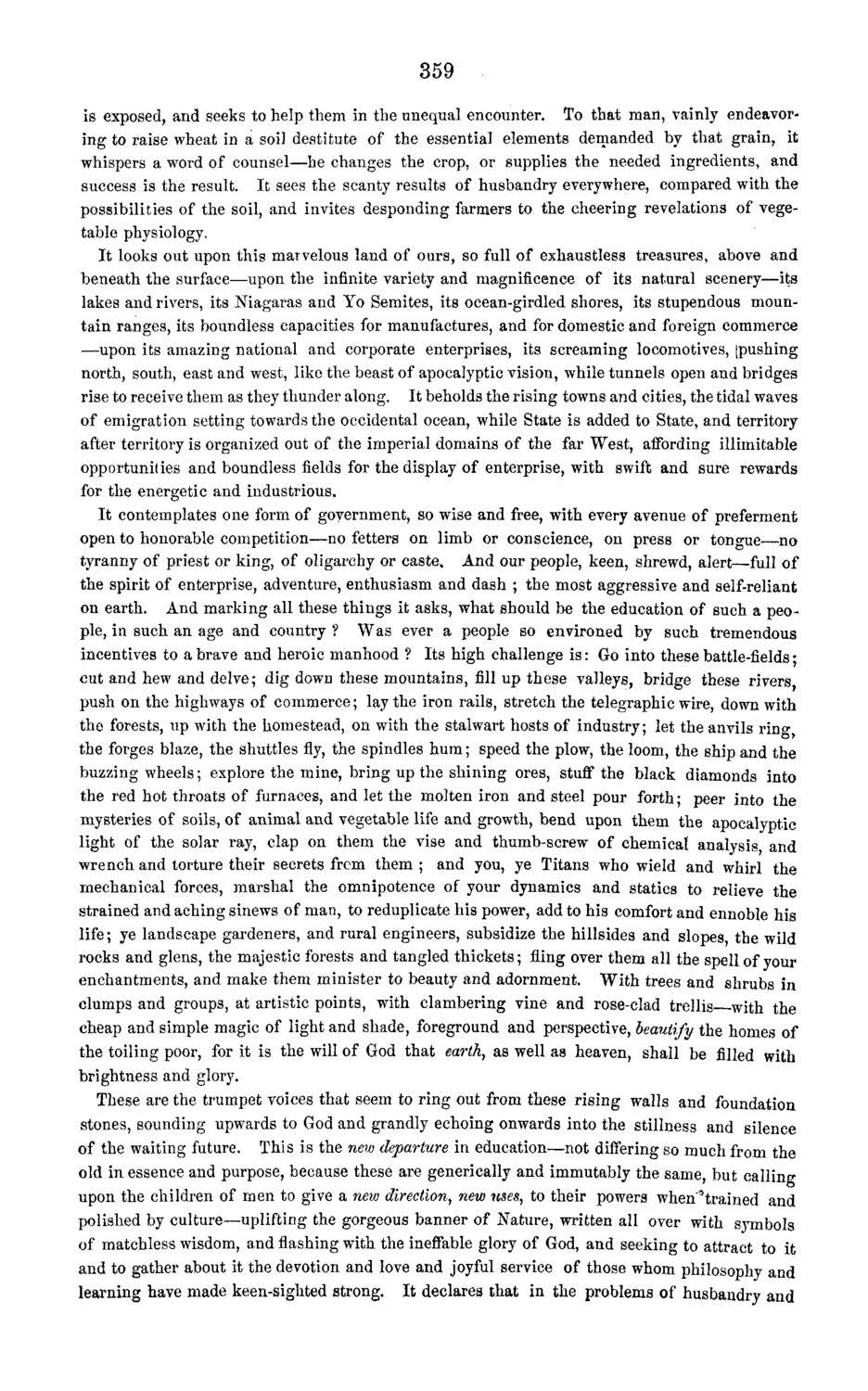| |
| |
Caption: Board of Trustees Minutes - 1871
This is a reduced-resolution page image for fast online browsing.

EXTRACTED TEXT FROM PAGE:
359 is exposed, and seeks to help them in the unequal encounter. To that man, vainly endeavoring to raise wheat in a soil destitute of the essential elements demanded by that grain, it whispers a word of counsel—he changes the crop, or supplies the needed ingredients, and success is the result. It sees the scanty results of husbandry everywhere, compared with the possibilities of the soil, and invites desponding farmers to the cheering revelations of vegetable physiology. It looks out upon this marvelous land of ours, so full of exhaustless treasures, above and beneath the surface—upon the infinite variety and magnificence of its natural scenery—its lakes and rivers, its Niagaras and Yo Semites, its ocean-girdled shores, its stupendous mountain ranges, its boundless capacities for manufactures, and for domestic and foreign commerce —upon its amazing national and corporate enterprises, its screaming locomotives, [pushing north, south, east and west, like the beast of apocalyptic vision, while tunnels open and bridges rise to receive them as they thunder along. It beholds the rising towns and cities, the tidal waves of emigration setting towards the occidental ocean, while State is added to State, and territory after territory is organized out of the imperial domains of the far West, affording illimitable opportunities and boundless fields for the display of enterprise, with swift and sure rewards for the energetic and industrious. It contemplates one form of government, so wise and free, with every avenue of preferment open to honorable competition—no fetters on limb or conscience, on press or tongue—no tyranny of priest or king, of oligarchy or caste. And our people, keen, shrewd, alert—full of the spirit of enterprise, adventure, enthusiasm and dash ; the most aggressive and self-reliant on earth. And marking all these things it asks, what should be the education of such a people, in such an age and country ? Was ever a people so environed by such tremendous incentives to a brave and heroic manhood ? Its high challenge is: Go into these battle-fields • cut and hew and delve; dig down these mountains, fill up these valleys, bridge these rivers push on the highways of commerce; lay the iron rails, stretch the telegraphic wire, down with the forests, up with the homestead, on with the stalwart hosts of industry; let the anvils ring the forges blaze, the shuttles fly, the spindles hum; speed the plow, the loom, the ship and the buzzing wheels; explore the mine, bring up the shining ores, stuff the black diamonds into the red hot throats of furnaces, and let the molten iron and steel pour forth; peer into the mysteries of soils, of animal and vegetable life and growth, bend upon them the apocalyptic light of the solar ray, clap on them the vise and thumb-screw of chemical analysis and wrench and torture their secrets frcm them ; and you, ye Titans who wield and whirl the mechanical forces, marshal the omnipotence of your dynamics and statics to relieve the strained and aching sinews of man, to reduplicate his power, add to his comfort and ennoble his life; ye landscape gardeners, and rural engineers, subsidize the hillsides and slopes, the wild rocks and glens, the majestic forests and tangled thickets; fling over them all the spell of your enchantments, and make them minister to beauty and adornment. With trees and shrubs in clumps and groups, at artistic points, with clambering vine and rose-clad trellis with the cheap and simple magic of light and shade, foreground and perspective, beautify the homes of the toiling poor, for it is the will of God that earth, as well as heaven, shall be filled with brightness and glory. These are the trumpet voices that seem to ring out from these rising walls and foundation stones, sounding upwards to God and grandly echoing onwards into the stillness and silence of the waiting future. This is the new departure in education—not differing so much from the old in essence and purpose, because these are generically and immutably the same, but calling upon the children of men to give a new direction, new uses, to their powers when"3trained and polished by culture—uplifting the gorgeous banner of Nature, written all over with symbols of matchless wisdom, and flashing with the ineffable glory of God, and seeking to attract to it and to gather about it the devotion and love and joyful service of those whom philosophy and learning have made keen-sighted strong. It declares that in the problems of husbandry and
| |